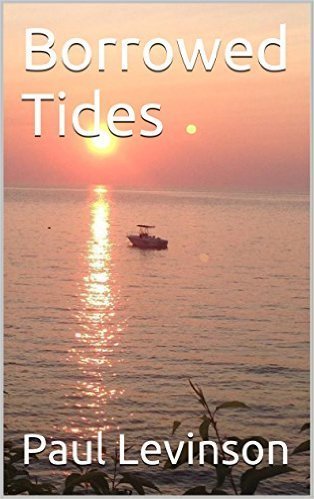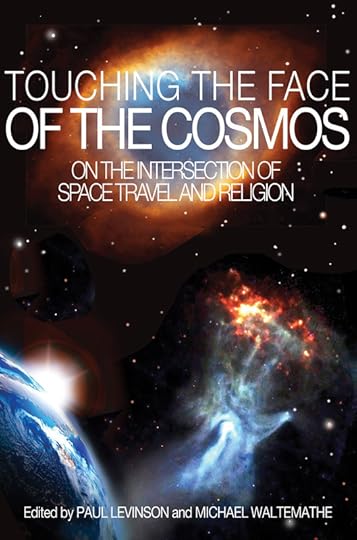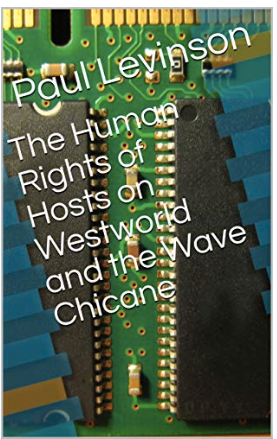Paul Levinson's Blog: Levinson at Large, page 118
September 9, 2020
Amazing Stories (2020)1.4: "Signs of Life": Happy Revivals

Pretty good analogy, huh? But I did think this was the most interesting, complex, and original of the four stories I've seen so far. Even though I did guess what was going on pretty early in the episode.
It was fun seeing it played out. Lost's Josh Holloway is always good to see on the screen. Last time was in Colony, unfortunately canceled after just three seasons. Significantly, there's a connection between Colony and "Signs of Life": extra-terrestrials. But I'm not going to say anymore about the plot.
Back to the acting, Holloway always manages to deliver a combination of toughness, hipness, and underlying warmth. It's not a common or easy combination. But the deeper warmth in this episode of Amazing Stories resides in the mother (who came out of the coma) and daughter relationship.
I mentioned in my review of the third episode that every one of these stories so far has a happy ending. The fourth episode is no exception. And I've got to say I'm happy about that. Science fiction and its weird tales cousin are usually short on happy endings. We could use a lot more of them in our real world and our fiction.
This first season of the new Amazing Stories is just five episodes, making it more a half season than a season. That's certainly not a happy ending. I hope there's a second half down the road. But I'll be back with a review of the fifth episode as soon as I get a chance to see it, in the next day or two.
See also Amazing Stories (2020) 1.1: "The Cellar": The Tops ... Amazing Stories (2020) 1.2: "The Heat": Life After Life ... Amazing Stories (2020) 1.3: "Dynoman and The Volt!": Sweet Superpowers
September 8, 2020
Amazing Stories (2020)1.3: "Dynoman and the Volt!": Sweet Superpowers

And this third episode has something else, something very special, with a capital "S" in the stars. It is Robert Forster's very last appearance on screen, made before his untimely death at age 78 in October 2019. I've loved Forster's work ever since his great appearance in Medium Cool in 1969 -- the cinema verite story of the 1968 Democratic Convention in Chicago -- and he made a memorable contribution to the TV series Heroes.
I mention Heroes because it has the same general theme as "Dynoman," the main difference being that the heroes in Heroes had natural superpowers, in contrast to Grandpa Joe Harris in "Dynoman and the Volt," who acquires his superpowers from a special ring, delivered to him just when he most needed it. That ring results not only in a big adventure, but the psychological reunification of Grandpa Joe with his grandson and son, who also get superpowers from the ring.
In the end, we get a heartwarming story which is more about real family than comic-book heroes, and that was a good thing to see. Thank you, Robert Forster, for bringing the world so many good hours of your great performances. I'm sad that you left us, but happy that you went out on such a profound and nurturing note.
See also Amazing Stories (2020) 1.1: "The Cellar": The Tops ... Amazing Stories 1.2: "The Heat": Life After Life

Review of Tobias Cabral's New Eyes: Newer Worlds
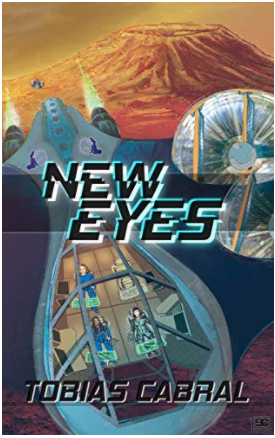
Tobias Cabral picked a good time to send me his 2018 novel New Eyes for review. Mars is in the air. Actually, it's always been in the air, or at least, at the top of the air, in the sky. But NASA's Perseverance is on its way to Mars, with a landing date in February of next year. Elon Musk wants to colonize the Red Planet (I'm 100% on board, here's a talk I gave at the 19th Annual International Mars Society Convention at The Catholic University in Washington, DC on 23 September 2016):
And I just saw, loved, and reviewed the first season of Away on Netflix.
Cabral's novel starts in February 2047. Trips to Mars take just four days. There's a space station named "Jeff Bezos," a ship named the "Elon Musk," and androids are "equipped with ‘minds’ that could not just pass but proctor the Turing Test" (italic and quotes around 'minds' in the novel). And, at least one is capable of murder. With the result that New Eyes is just as much in the tradition of Westworld and the new Raised by Wolves (see my reviews) as it is a descendant of The Martian Chronicles and The Martian.
But as the title suggests, the fulcrum of this narrative are eyes, in particular Gaspar's "Martian eyes". The character's a "bio-cyberneticist," women desire his body, and his new eyes in effect make him a human on the way to becoming an android, in the time-honored Six Million Dollar Man way.
The novel also has resonance to the work of Orson Scott Card (sims play an important role, as in, you often can't tell what's really really real) and, to my eyes, at least, the novel reads a lot like Isaac Asimov (a big compliment in my book). But as to the plot, well, Mars is "a mostly-unpopulated planet" at this point, and this "young Martian society" is populated by humans and increasingly by androids. Could this actually happen by 2047? Probably not (more because of the androids than living on Mars). But my late editor at Tor, David Hartwell, always told me that readers are willing to grant you at least one big part of a story they find unbelievable, and I'm happy to grant Cabral that. I should also mention that Cabral throws in a bit more repartee humor than does Asimov -- someone comments that someone has a "nice assonance... that sounded naughty" -- and there's even some rapping in this story.
But that still doesn't tell you much about the nuts and bolts of the plot, does it? You'll need to set your eyes on the novel to find that out. Ok, I'm in a good mood. Here's a quote from the novel: - think "alternate branches in a Many Worlds Hypothesis time travel story". And enjoy.
first starship to Alpha Centauri leaves from Mars Vestibule ...
September 7, 2020
Young Wallander: Done Right

Doing a narrative of a younger version of a famed older character is a tricky business. Without going into which ones worked and which ones did not, and why, let's just say that some of them, maybe even most of them, did not.
So Young Wallander, now on Netflix, had its work cut out for it. The older Wallander, a detective whose emotions got in his way, and had trouble with personal relationships, for every part of him that was a brilliant police detective, was a hard character to get right in his formative stages, indeed, his first sojourn as a police detective. And I thought Young Wallander got it right.
First, the series made the right decision to the put the story in the present. Although history can be fun, it was even more fun, I thought, to see Kurt Wallander starting his career in a world, our world, of YouTube videos and smartphones. And Malmo, Sweden in the present looks good, too, and a fit place to grapple with current problems like immigration. (No mention of COVID-19, though - the series couldn't be that current - but I bet we'll see that next season.)
But most satisfyingly, we see young Wallander striving with a lack of complete success to keep his emotions out of his work. He can't, because his insights into crime flow from his keen emotions. He also has trouble establishing a relationship with Mona, who in later times will be Wallander's ex-wife. All of which is brought together by a fine cast, including Adam Pålsson as Wallander, Ellise Chappell as Mona, and Richard Dillane who always delivers as young Wallander's boss.
I'll say no more about the plot - I've so far said almost nothing about that - because I don't want to give anything away. But these are a thoroughly excellent six episodes, and I'm looking forward to more.
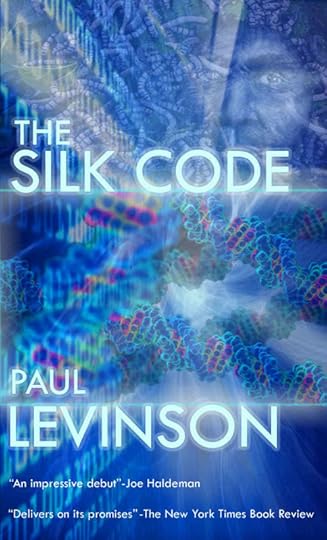
Paul Levinson's books ... Paul Levinson's music
September 6, 2020
We Hunt Together 1.5: Short and Deadly

We learned two very important things about Freddy in We Hunt Together 1.5:
1. Nothing the teacher did at that school turned her into a murderer when Freddy was still Lily. Instead, Lily was already a murderer, or at least became a murderer, when she killed the original Freddy, who, it turns out, didn't commit suicide.
2. Freddy doesn't need Baba to do her killings. Maybe she needed him at the beginning of the story, but not any more. She takes matters into her own hands when Baba objects to killing the teacher, and kills him herself.
This might mean, if the series were continuing beyond the next and final episode of this season, that Freddy might leave Baba, or even kill him, to cover her tracks, because she no longer needs him to do her dirty work. On the hand, maybe she truly loves him, and would want to be with him in any case. Who knows? And the point is we'll likely never know, because next week is the season finale.
Which is too bad. We hardly learned anything about Jackson and Lola in episode 1.5, except Jackson got pretty angry with his wife, and cursed her out on the phone. Why? Because he's falling in love with Lola? I doubt we'll get the answer to that, either, next week.
Which makes me wonder what we will find out next week? That Freddy and Baba get apprehended? I don't know, I can't quite see that happening, either. Which is testament to how good and different We Hunt Together is, which speaks to the reason for another season, which is what I've been saying in these last few paragraphs.
See you here next week.
See also We Hunt Together 1.1: Compelling Pairs ... We Hunt Together 1.2: Upping the Game ... We Hunt Together 1.3: Fine Tuning ... We Hunt Together 1.4: No Murder, But ...

Paul Levinson's books ... Paul Levinson's music
September 5, 2020
Away: Relationships and Reality in Space

My wife and I just finished binge-watching Away, a 10-episode series, on Netflix. I can't recall a better movie or television series about missions to Mars or early human settlements on Mars, and that includes contenders like The Martian, The Martian Chronicles, and Total Recall.
The great strength of Away, that puts it in a class of its own, is its attention to families and loved ones of astronauts back on Earth, and relationships among the five space travelers in the Atlas. These include Hilary Swank in one of the best performances of her career as U. S. Commander Emma Green and Mark Ivanir, whom I don't think I've seen before, as the Russian cosmonaut Misha with the most previous experience in space. Vivian Wu as Lu (Chinese), Ray Panthaki as Ram (from India), and Ato Essandoh as Kwesi (from Africa, and devoutly Jewish, which adds a religious dimension to the story) round out the international crew. Each one of has a special combination of talents, and powerful personalities which are often abrasive, vulnerable, and usually devoted to the mission, which makes for a compelling tableau of a first mission to Mars narrative with humans aboard.
Missions to any world off this planet are inherently perilous just about every moment, and Away conveys these dangers unsparingly and harrowingly. Fortunately, The Good Wife's Josh Charles plays Emma's husband Matt, who is good at both taking care of their understandably very worried teenaged daughter Alexis (well-played by Talitha Eliana Bateman) and coming up with some ingenious solutions to the Atlas's problems in space. But none of these solutions are easily implemented, and to watch the ten episodes of Away is to be treated to a continuing set of close encounters with failure and death, often stunningly presented, and making you feel that you're in a front-two seat somehow somewhere in space or on the ship, watching the incredible events unfold.
Two minor quibbles. One, MSNBC's Rachel Maddow puts in an appearance as herself early on, and she looks exactly as I just saw her last night on MSNBC. Since Away must be taking place at least a decade or two in the future, what did Rachel do, drink some immortality tonic in the very near future? Second, the Atlas crew talk to people back on Earth via instant smartphones for the first half of the journey, and then normal phone conversations become impossible. In reality, the capacity to have a conversation should have deteriorated gradually and continually throughout the voyage to Mars.
But there are small quibbles indeed, and I very much hope there's another season.

my Summer 2015 interview with John Glenn Paul Levinson's books ... Paul Levinson's music
September 4, 2020
Podcast Review of Raised by Wolves 1-3
Welcome to Light On Light Through, Episode 144, in which I review the first three episodes of a powerful new science fiction series, Raised by Wolves.
Further reading:
blog post reviews:
Raised by Wolves 1.1: Fast Action and Deep Philosophy Raised by Wolves 1.2-3: More than Meets the EyePaul Levinson's books ... Paul Levinson's music
Review of Raised by Wolves 1-3
Welcome to Light On Light Through, Episode 144, in which I review the first three episodes of a powerful new science fiction series, Raised by Wolves.
Further reading (blog posts):
Raised by Wolves 1.1: Fast Action and Deep Philosophy Raised by Wolves 1.2-3: More than Meets the EyePaul Levinson's books ... Paul Levinson's music
September 3, 2020
Raised by Wolves 1.2-3: More than Meets the Eye

I just watched Raised by Wolves 1.2 and 1.3, on HBO Max. It's all that is available there now (along with the first episode that I saw and reviewed the other night), but the three are more than enough to show this will be a major science fiction series, with a complex, multi-level, intriguing narrative, indeed.
First, we learn a couple of things. There's a lot more to Marcus than meets the eye. He's actually an atheist, who along with his wife Sue underwent plastic surgery, so the two could take the place of the original Marcus and Sue that the atheist "Marcus" killed, so the new Marcus and Sue could get on-board the great Sol-believer interstellar arc. And they also became parents of the original couple's young son, whom the new Marcus (I think) gave a little white mouse to, as a present, before they all embarked on the arc. All of which play in a role in the narrative, which gives the story a Space Family Robinson or Lost in Space on speed or LSD kind of quality, which is quite a ride.
And that's less than half of it. Mother is a much more powerful android than is Father, who is just a general-purpose not deadly weapon android, but he's equipped with plenty of smarts, too. And heart. When Mother starts blaming herself for the death of the other kids (other than Campion, who is alive and well and brilliant), Father discovers the real reason the other kids died. And Mother, wanting to recreate the family she lost to this unforgiving planet, has taken a bunch of other kids of various ages from the defeated arc. These range from cute to pretty interesting, and they include Marcus and Sue's "son".
And there's still more. There are some sorts of monsters at large on this planet, which presumably are indigenous species, but, who knows. So all of this adds up to a great, provocative start for a highly intelligent, vividly depicted science fiction series, which I'm looking forward to watching.
See also Raised by Wolves 1.1: Fast Action and Deep Philosophy
September 2, 2020
Amazing Stories (2020) 1.2: "The Heat": Life after Life

Life after death stories - the departed coming back to help, haunt, or otherwise interact with the living - are a dime a dozen. Amazing Stories' (2020) second episode, "The Heat," manages to visit this well-trodden path with a story that is at least somewhat original, even if that originality relies upon yet another very well-worn gambit in fiction.
Tuka and Sterling are track athletes and best friends, until a typical teenager argument leads to Tuku getting killed in a hit-and-run, right before Sterling's horrified eyes. Most of the rest of the episode tells the story of Tuka's ghost connecting with Sterling, and helping her run and compete again, and maybe win in crucial track-meet race.
Except, Sterling doesn't, and here's where "The Heat" veers into both originality but some kind of ultimate cliche. The originality is in Sterling's not winning, which would be the expected result in what had come before. But what happens after that, when the ghostly Tuka tries to comfort and inspire Sterling is, well ...
It turns out - at least, I think that's what's going on - that Tuka wasn't really killed in the hit-and-run. She's just temporarily stunned, and comes back to full consciousness and life after she asks Sterling to kiss her, tenderly on the lips, aka romantically, Now I thought the kiss was excellent because it showed the two young women had a deeper connection that just friends, and it harkened back to the fairytale ending of kissing the deceased back to life.
But that ending also means that everything we saw earlier in the episode was, what, going on in Tuka's mind while she was unconscious on the street? That kind of ending - that what transpired was a protagonist's dream - is even more cliched that the dead coming back as a ghosts.
So, all in all, a mixed bag of an episode as far as originality. But "The Heat" did have heart - as it turns out, a never unbeating one - and Hailey Kilgore and Emyri Crutchfield put in good performances as Tuka and Sterling, so I'd recommend it.
See also Amazing Stories (2020) 1.1: "The Cellar": The Tops

Levinson at Large
- Paul Levinson's profile
- 340 followers


